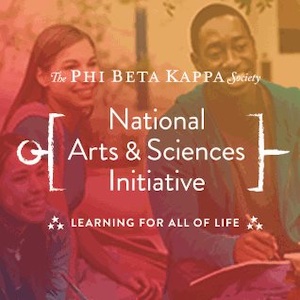Each fall, the National Humanities Conference brings together people from colleges, universities, learned societies like Phi Beta Kappa, state humanities councils, and cultural institutions to explore how to deepen broader engagement with the humanities on campuses and in communities. Co-hosted by the State Federation of Humanities Councils, the National Humanities Alliance, and Indiana Humanities in Indianapolis, this year’s apt theme focused on “crossroads” in a public moment deeply affected by war, political dysfunction, and polarization.
How could participants use this time together to consider reflection points, intersections, and new directions in the humanities to meet this moment? The collective conference responses, ranging from the profound to the practical, serve as inspiration for the work of the Society’s National Arts & Sciences Initiative as we look ahead to 2024.
A keynote conversation featured author and journalist A’Lelia Bundles (ΦBK, Harvard College), who is the great-great-granddaughter of entrepreneur Madam C.J. Walker, and noted scholar of African American philanthropy Tyrone McKinley Freeman. Their interchange encouraged the audience to seize more opportunities to insert perspectives, context, and humanity into conversations that give voice to all in a time of rising book bans and challenges to academic freedom across the nation. Although Madam Walker was well-known as a savvy businessperson, Bundles identified her greatest contributions as a philanthropist, advocate, and activist who created a cultural place accessible to all in downtown Indianapolis almost 100 years ago and suggested ways to continue her legacy in our own communities.
In her introduction of National Endowment for the Humanities Chair Shelly Lowe, Eva Caldera (ΦBK, Harvard College) noted the new roles that humanities are playing as cultural first responders and courageous organizations. Lowe developed this theme further in her remarks: “Engaging in the work of the humanities is itself an exercise in courage. Through the humanities, we can approach a topic, however painful, in the spirit of fearless inquiry. The humanities help us to ask tough questions and give us the strength to grapple with the answers.” In closing, Lowe encouraged conference participants to explain the humanities more accessibly and explore new ways of reaching the public like the Next Gen (eration) Humanities Conference taking place in Arkansas in March 2024.
Fortunately, the conference also highlighted how Phi Beta Kappa members and partner organizations are answering this call. Christine Henseler (ΦBK, University of Kansas), co-director of a new Center for Humanities Communication, led a robust workshop about resources, marketing, and audience curation for humanities practitioners inspired by the successes of science communications. Similarly, the Humanities Indicators Project at the American Academy of Arts and Sciences released new state profiles showing career outcomes for humanities majors in every state that will prove helpful as state legislative sessions begin next year.
As we look forward to supporting the liberal arts and sciences in 2024, students can apply for the Society’s Key into Public Service $5,000 scholarship and educational conference experience by January 22, 2024. And all members can access our toolkit for sample letters to connect with state policymakers. Learn more at pbk.org/arts-sciences.




